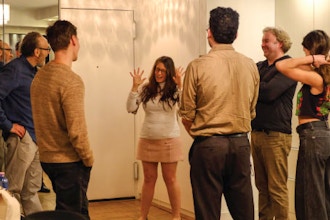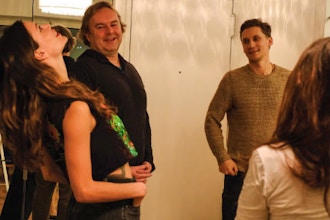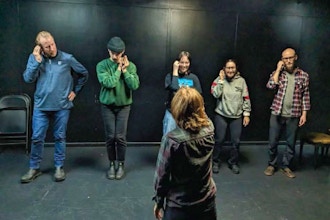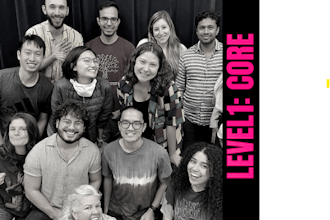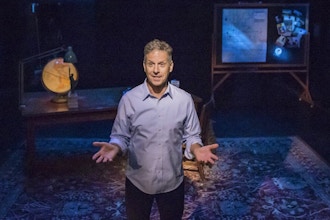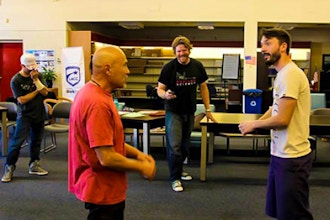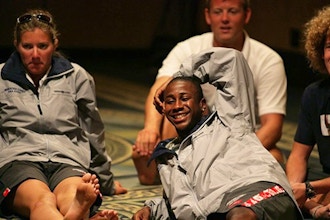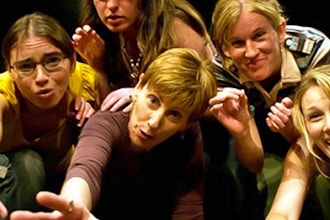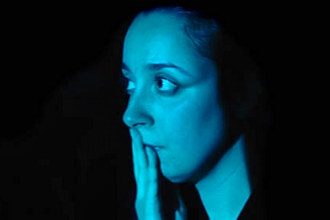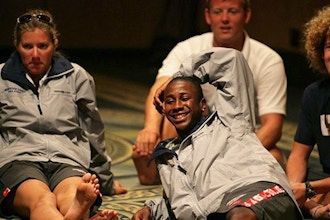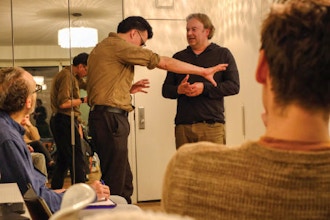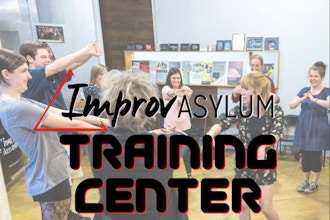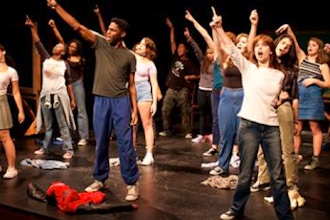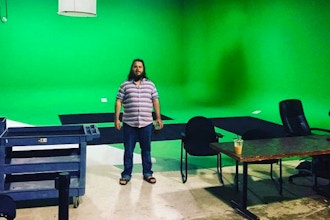Discover the Best Improv Classes Near Me
Improvisational theatre (also known as improv) is a form of spontaneous ensemble theatre. Improv is oftentimes comedic in nature but is always unplanned and unscripted. Actors (also referred to as players) engaging in improv will create the scene as it unfolds. They form dialogue, action, storyline, and characters through collaboration in real-time. Some improv games, however, allow players to determine the general parameters of the scene ahead of the beginning, such as the setting or situation the characters they are developing will find themselves.
Improv is an old art form, with its Western roots dating back to ancient Rome. The first documented improvisations took place at the Atellan Farce of 391 BC. These farces were masked improvised comedy performances. Characters were decided beforehand, but all dialogue was improvised. Later, improv would be used by performers throughout the world who would take to the streets to show off their quick, comedic thinking.
It wasn’t until the 20th century that improv took a professional turn. Various styles of improv have emerged: improv games (short form), improv scenes (long form), and improvised plays (narrative improv). Improv comedy clubs erupted in the mid-20th century. These clubs still exist today, allowing new and veteran performers to get up in front of an audience and work on their new material. Many of these clubs also inspired improvisational television series that have propelled comedians to household names.
Improv today is a popular form of live entertainment. It is considered an important skill for actors to have and is a part of most drama training curriculums. Because improv has low barriers to access, it has become an enjoyable activity for groups as well. Whether performing professionally onstage or in the company of a group of friends, improv is a historical form of live theatre, especially in the US.
Why You Should Learn Improv
Do you have stage fright? Are you nervous when giving presentations or speeches in front of an audience? If you find yourself nervous to speak or perform in front of others, improv might be the perfect activity for you.
Improv requires you to think on your feet as you develop a storyline and character in front of a live audience. Improv uses no scripts or pre-planned dialogue. Instead, you must rely on yourself and, if working with others, your scene partner or group. Performing improv may be intimidating at first, but with lots of practice and dedication, you will grow to be more comfortable expressing yourself in front of others.
With improv comes potential failure. All improv players face this at some point when they can’t think of how to continue a scene. This is inevitable, but it shouldn’t discourage you from improv. Although the prospect of failing in front of others can be embarrassing or frightening, the more improv scenes you take part in, the more your confidence will grow. As you become confident in yourself on stage, you can focus more on crafting your scene and your ability to perform, rather than focus on the failures that may await you.
Like many forms of art, improv provides participants with a creative outlet. The spontaneous nature of improv allows you to use your imagination as you work to create dialogue, actions, and characterization off the top of your head. Research has shown that when improvising, the creative side of your brain works more than usual.
Additionally, improv has been shown to reduce social anxiety and uncertainty tolerance. Although beginning improv may lead you to feel anxious, actively engaging in an improv class for just 20 minutes can reduce this anxiety as you grow more comfortable. Uncertainty intolerance is how uncomfortable you feel around uncertain things or in uncertain situations, which can hamper your ability to partake in new tasks and increase anxiety. Engaging in improv leads to significant decreases in uncertainty intolerance, making you more comfortable with uncertainty.
5 Ways to Learn Improv
Improv is an incredibly accessible activity with low barriers to entry. As they say, everyone can act. If you’re interested in gaining experience with improv or learning basic improv games, try one of these learning methods:
- Take an in-person class taught by an expert instructor. Basic improv classes will walk you through the fundamentals of improv, including how to begin scenes. In-person classes will also likely provide any necessary materials or props.
- Sign up for a live online course taught remotely. Online classes are taught by live instructors who can give you live feedback. If any materials or props are needed for your class, your instructor will let you know ahead of your session.
- Online videos or tutorials are available on-demand that you can work through at your own pace. Keep in mind that while these are often free and readily accessible, you will not have an instructor available to you to answer questions you might have.
- Practice improv by playing improv games with your friends. There are plenty of improv warm-up games explained online. Although this isn’t a formal way to learn improv, practicing with your friends in a fun and comfortable setting is a great way to get past the fear of making mistakes in a scene.
- Watch an improv show, film, or special. Improvisation has been used in silent films and has also been a technique used in many comedy shows of the ‘90s and 2000s. By watching filmed improv, you can take the way that experienced comedians and actors have utilized the technique.
In-Person Improv Classes
In-person improv classes are offered across the US at a variety of skill levels. These classes are a great way to meet others with a passion for improv who can help you work on your own techniques as you create a scene together. Whether you have a serious interest in improv or are looking for a fun way to work on your confidence and acting, in-person classes will give you hands-on experience in a friendly environment.
The Magnet Training Center, located around two blocks northwest of Madison Square Park in Manhattan, offers several improv classes. Improv beginners can get started in either their Principles of Improv class or their Improv Level One Intensive. In Principles of Improv, you’ll jump right into warm-up-style improv games before working your way up to two-person scenes, group scenes, group games, and monologues. The Improv Intensive is perfect for fearless learners. In this class, you’ll immediately get onstage and begin exploring the fundamentals of improvisation with a partner.
Once you’ve taken the first two levels of the Magnet Training Center’s improv intensive classes, you can take their Improv Level Three Intensive. In this class, you will focus on the Harold improv format, a popular long-form improv structure. At the end of the class, you will perform a Harold at your class graduation show. If you have a teen that is also interested in learning improv, they can take Improv for Teens, a fundamentals course for anyone aged 12 through 17.
The Barrow Group Acting School in Hell’s Kitchen offers classes in a variety of acting techniques, including improv. They often offer improv classes for adults with a range of improv experiences. These include introductory classes where you’ll learn the basics of improv to advanced classes where you’ll practice long-form improv. Additionally, families can enroll their tweens or teens in the school’s improv and sketch comedy classes and summer camp, both of which end in an open class that friends and family can attend.
The Barrow Group Acting School also offers a wide variety of other acting and theatre classes, like an introductory class in Shakespeare and in-depth scene-studying workshops. If you’ve decided that your interests lie off the stage, you can also check out one of their playwriting classes. Although these might not focus specifically on improv techniques, many of the skills you will learn in these classes are transferable to improv. Working on scene development can help you improve your improv scenes, while a playwriting class may give you a better understanding of how to develop a character.
For anyone in the Los Angeles area, Los Angeles City College located in East Hollywood offers level one and level two comedy improv classes. In Off-the-Cuff: Comedy Improv (Level 1), beginners will work on the building blocks of comedic improv. This class places emphasis on improving your communication, teamwork, and listening skills through improv so that you may transfer these skills over to your personal and professional life. The level two class does all this in more as you focus on more intermediate-level improv exercises.
In Burbank, California, DBA Flappers University offers the class Intro to Stand Up Comedy. Here you and other participants will be taught the fundamentals of stand-up comedy, including improv skills that are required for structuring a joke in a stand-up setting.
If you’re located in the Seattle area and would like to work on your improv skills, CSz Seattle in Fremont hosts three classes at the beginner, intermediate, and advanced levels. In The Improv Jam, you and your fellow players will be led by an improv veteran through various exercises and scene work. A step up from this class if you’ve taken their Improv Comedy 101 class, is Improv Comedy 201. This intermediate-level experience offers instruction in scene work, characters, and relationships.
Finally, CSz Seattle offers Improv Comedy 301. In this advanced-level class, your instructor will provide you with direct feedback to help improve your scene work. You will also learn advanced scene work techniques. The improv games in this class are also the most challenging offered by CSz, allowing you to work on elevating your improv skills.
If you’re looking to branch out to other forms of acting, CAST events in Manhattan offers Voiceover Intensive, a five-hour voiceover workshop. You and up to nine other participants will work through the psychology behind voiceover work and even how to succeed in a voiceover audition. Brushing up on voiceover techniques is yet another skill that can be transferred to your improv work, as it may allow you to develop characteristics of the characters you develop within a scene.
In-person improv classes and workshops are regularly offered to adults and are listed on CourseHorse. If you don’t see any available classes in your area, be sure to check back on CourseHorse regularly, or reach out to a school that has offered classes in the past. They may let you know when improv classes will be added back to their schedules. For now, consider checking out the above-mentioned classes or looking into other acting and theatre classes offered.
Virtual Improv Classes
In-person improv classes led by a seasoned instructor offer direct feedback and detailed demonstrations. In these classes, you’ll be able to witness your instructor and other participants work on their scene work. If any props are required for your scene work, in-person classes are also likely to provide them. Additionally, in-person classes are great if you’re looking to socialize and share tips and techniques with others interested in improv.
However, in-person classes aren’t always available or accessible. Virtual classes are an option for anyone who can’t take in-person improv classes, whether it be because of location, class availability, or schedule. Virtual classes are taught around the US and teach a variety of improv techniques and fundamentals. The remote format of virtual classes allows you to take them from anywhere, making them the perfect option for anyone who can’t commute to an in-person class. There are a few online improv classes available for you to take on CourseHorse.
Improvise, Socialize, Revitalize is a relaxed beginner class in improv offered by Kissin Improv online. You and your fellow participants will practice and work toward mastering the principles of improv in this one-session class. If you find this class fun and enjoyable, Kissin Improv also offers it in a four-session format. This longer-length course emphasizes having fun while meeting others who enjoy the art of improv.
Other online improv courses are offered regularly throughout the year, so be sure to check back to CourseHorse periodically to see what new and returning classes are available. Previous classes have focused on the principles of improv as well while allowing you to jump right into an improv scene, which can help you work on your public speaking and confidence.
Private Group Improv Classes
Are you looking to schedule an improv class as a fun team-building activity for your business or organization? Or are you and a group of friends looking to get together and participate in fun improv games? If so, CourseHorse offers improv classes for private groups they can deliver to you.
Up to 40 people can take CourseHorse’s virtual Team-Building Improv Workshop. In this class, your group will work through a series of improv games and exercises. This team-building workshop aims to practice listening, collaborating, and working on problem-solving with a group, all while having fun and socializing. After this course, your group can expect greater insight into effective collaboration and the ability to make quick decisions.
For smaller work groups, CourseHorse offers a virtual Corporate Improv Workshop. Up to 20 people can be accommodated in this class where they will be led through improv games and work on their communication skills. Participants are encouraged to go with the flow in this class as they work on creating funny scenes in collaboration with their coworkers.
If your group is interested in working on their public speaking skills, you may be interested in the virtual class, Public Speaking through Stand-up. This team-building class is taught by a professional comedian. Your team will work on joke writing while also improving their communication and public speaking skills.
If none of these classes fit your group’s needs or interests, CourseHorse can work with you to find or create one that will. Just reach out to CourseHorse through the contact form on their website to see what other courses can be delivered to you and your group.
CourseHorse’s virtual classes can accommodate a number of participants. Each class page will tell you the maximum group size. If you’re not sure of your group’s size at the time of sign-up, you can select the minimum group size and update your headcount up to a week before your class. CourseHorse can host their classes over several platforms, but they recommend using Zoom.
What Will I Need to Learn Improv?
No materials or supplies are necessary to learn improv. The audience’s imagination is key to improv. Your goal is to make the scene you are performing believable. Improv is typically performed on a bare stage, although some improvisers choose to work with physical props. If props are necessary when taking an in-person class, your instructor will provide them or let you know what to bring beforehand.
Is it Difficult to Learn Improv?
Improv can be difficult for anyone who lacks confidence in their public speaking or has stage fright. Your improv audience may also be full of strangers, which can make your mistakes feel ten times worse than they really are. But managing your nerves and moving ahead with improv practice and performances can help improve your confidence and make standing up in front of others and performing much easier.
With enough passion and practice, improv will become easier. Once you’re accustomed to performing in front of others, you’ll be able to focus more on your actual performance. You’ll then be able to work on improving your ability to build a scene, convey actions, and develop the character you are portraying.
Improv is an accessible art form that has been around for centuries. If you’re devoted to learning it, it can be a rewarding experience. With improv, you will have the opportunity to work on your creativity and public speaking along with other personal and interpersonal skills.

